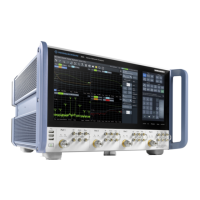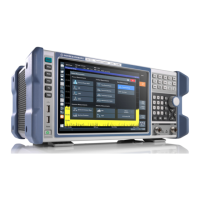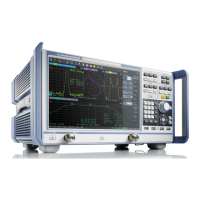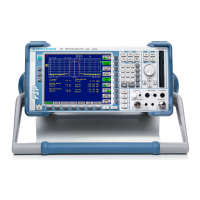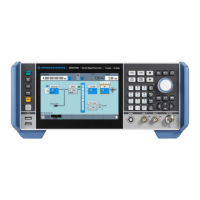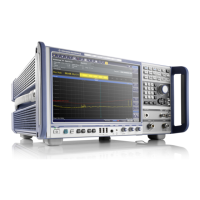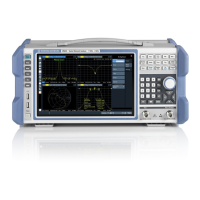Channel Menu R&S
®
ZVA/ZVB/ZVT
1145.1084.12 4.232 E-6
If a dispersive connector type (i.e. a waveguide; see Offset Model dialog) is assigned to a test
port that is related to a particular quantity, then the phase of the quantity is corrected using both
the (constant) specified length offset parameter and the dispersion effects due to the
connector.
Offset parameters; Application and effect
Offset parameters can be particularly useful if the DUT is connected to a transmission line that
cannot be taken into account in a calibration, e.g. because it is fixed to the DUT and cannot be
removed.
An offset is assigned to a particular port and affects the phase of all measurement parameters
related to this port. An offset for port 1 affects the S-parameters S
1
1
, S
2
1
, S
1
2
, S
3
1
..., the Z-
parameters Z
11
, Z
21
,Z
12
, Z
31
etc.
To account for the propagation in both directions, the phase shift of a reflection
parameter due to a given length offset is twice the phase shift of a transmission parameter. If,
at a frequency of 300 MHz, the electrical length is increased by 250 mm (/4), then the phase
of S
21
increases by 90 deg, whereas the phase of S
11
increases by 180 deg.
If the trace is converted to the Delay format, changing the offset parameters simply shifts the
whole trace in vertical direction. The sign of the phase shift is determined as follows:
• A positive offset parameter causes a positive phase shift of the measured parameter
and therefore reduces the calculated (residual) delay.
• A negative offset parameter causes a negative phase shift of the measured parameter
and therefore increases the calculated (residual) delay.
Offset parameters for balanced ports
The functions in the Offset menu can be used for balanced port configurations:
• If a balanced port configuration is active the logical and physical ports are shown in the
Electrical Length, Mechanical Length and Delay dialogs.
• Offset parameters must be assigned to both physical ports of a logical port.
• Auto Length corrects the length offset of both physical ports of a logical port by the
same amount.
The length offset can be defined separately for each port.
• Reset Offsets restores the default values for all length offsets, i.e. it resets all values to zero.
• Electrical Length defines electrical length offsets.
• Mechanical Length defines mechanical length offsets.
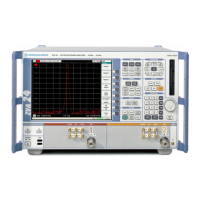
